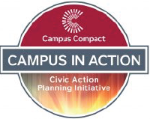Post Graduate Service
Looking to engage in full-time service after graduation, such as AmeriCorps or Peace Corps? There are many options to choose from and the choices can often be overwhelming. Check out the following resource guide to help you with your decision.
Benefits
Full-time volunteer service opportunities may not pay much or anything, but they do offer valuable benefits including…
• a chance to serve others
• travel opportunities
• the chance to meet new and diverse people
• valuable career preparation
• the chance to experience something new
• a possible foot in the door for a “real” job
• opportunities for any major
Housing/Living Allowance
In many cases, agencies will provide volunteers with either free housing and/or meal plans or will provide a living allowance to cover this cost. Allowances tend to be minimal, but usually are enough to get by. Typically, you won’t have to pay to be a full-time volunteer. In some cases, you may receive both housing arrangements and a living allowance!
Insurance
Almost all full-time volunteer service agencies provide some sort of health insurance. In some cases they may even offer low cost life insurance.
Loan Deferment
In many cases, full-time volunteer service qualifies you to defer your student loans. Public service and volunteering allows you a limit of three years to defer your student loans while in service. This can be a big help if you do not have a large stipend to live off of.
Education Loan Repayment
AmeriCorps and Peace Corps both offer educational incentives to volunteer. AmeriCorps has many service opportunities that offer an Educational Award that can be used to pay off existing or future student loans, or used on tuition. Peace Corps service can help reduce a student’s Perkins loan by 15% for each year of service.
Educational Credit
Some volunteer opportunities will provide college credit for your service. Check the programs you are interested in for this opportunity.
Training and Professional Development
Many programs offer thorough training programs that can include conflict resolution, problem-solving, leadership skills, and other management related training. Programs might also offer specific training related to the service that you will be providing such as construction skills, CPR, first aid, etc. These skills are all things that can prepare you for future careers.
AmeriCorps Comparison Chart
Curious about the difference among the various AmeriCorps programs? Check out this National Service Comparison Chart









